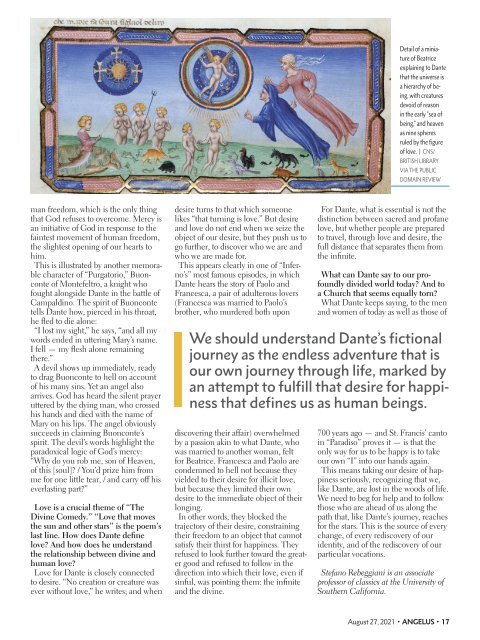Angelus News | August 27, 2021 | Vol. 6 No. 17
On the cover: Sept. 14 will mark the 700th anniversary of the death of Dante Alighieri. Around the world, the milestone is sparking renewed attention to his legacy and even a “Year of Dante” in the poet’s native Italy. On Page 10, art historian Elizabeth Lev argues that today’s language-obsessed culture needs Dante’s faith in the beauty of words more than ever before. On Page 14, Dante scholar Enzo Arnone explains the spiritual lessons “The Divine Comedy” can offer Christians and wandering souls alike.
On the cover: Sept. 14 will mark the 700th anniversary of the death of Dante Alighieri. Around the world, the milestone is sparking renewed attention to his legacy and even a “Year of Dante” in the poet’s native Italy. On Page 10, art historian Elizabeth Lev argues that today’s language-obsessed culture needs Dante’s faith in the beauty of words more than ever before. On Page 14, Dante scholar Enzo Arnone explains the spiritual lessons “The Divine Comedy” can offer Christians and wandering souls alike.
You also want an ePaper? Increase the reach of your titles
YUMPU automatically turns print PDFs into web optimized ePapers that Google loves.
Detail of a miniature<br />
of Beatrice<br />
explaining to Dante<br />
that the universe is<br />
a hierarchy of being,<br />
with creatures<br />
devoid of reason<br />
in the early "sea of<br />
being," and heaven<br />
as nine spheres<br />
ruled by the figure<br />
of love. | CNS/<br />
BRITISH LIBRARY<br />
VIA THE PUBLIC<br />
DOMAIN REVIEW<br />
man freedom, which is the only thing<br />
that God refuses to overcome. Mercy is<br />
an initiative of God in response to the<br />
faintest movement of human freedom,<br />
the slightest opening of our hearts to<br />
him.<br />
This is illustrated by another memorable<br />
character of “Purgatorio,” Buonconte<br />
of Montefeltro, a knight who<br />
fought alongside Dante in the battle of<br />
Campaldino. The spirit of Buonconte<br />
tells Dante how, pierced in his throat,<br />
he fled to die alone:<br />
“I lost my sight,” he says, “and all my<br />
words ended in uttering Mary’s name.<br />
I fell — my flesh alone remaining<br />
there.”<br />
A devil shows up immediately, ready<br />
to drag Buonconte to hell on account<br />
of his many sins. Yet an angel also<br />
arrives. God has heard the silent prayer<br />
uttered by the dying man, who crossed<br />
his hands and died with the name of<br />
Mary on his lips. The angel obviously<br />
succeeds in claiming Buonconte’s<br />
spirit. The devil’s words highlight the<br />
paradoxical logic of God’s mercy:<br />
“Why do you rob me, son of Heaven,<br />
of this [soul]? / You’d prize him from<br />
me for one little tear, / and carry off his<br />
everlasting part?”<br />
Love is a crucial theme of “The<br />
Divine Comedy.” “Love that moves<br />
the sun and other stars” is the poem’s<br />
last line. How does Dante define<br />
love? And how does he understand<br />
the relationship between divine and<br />
human love?<br />
Love for Dante is closely connected<br />
to desire. “<strong>No</strong> creation or creature was<br />
ever without love,” he writes; and when<br />
desire turns to that which someone<br />
likes “that turning is love.” But desire<br />
and love do not end when we seize the<br />
object of our desire, but they push us to<br />
go further, to discover who we are and<br />
who we are made for.<br />
This appears clearly in one of “Inferno’s”<br />
most famous episodes, in which<br />
Dante hears the story of Paolo and<br />
Francesca, a pair of adulterous lovers<br />
(Francesca was married to Paolo’s<br />
brother, who murdered both upon<br />
discovering their affair) overwhelmed<br />
by a passion akin to what Dante, who<br />
was married to another woman, felt<br />
for Beatrice. Francesca and Paolo are<br />
condemned to hell not because they<br />
yielded to their desire for illicit love,<br />
but because they limited their own<br />
desire to the immediate object of their<br />
longing.<br />
In other words, they blocked the<br />
trajectory of their desire, constraining<br />
their freedom to an object that cannot<br />
satisfy their thirst for happiness. They<br />
refused to look further toward the greater<br />
good and refused to follow in the<br />
direction into which their love, even if<br />
sinful, was pointing them: the infinite<br />
and the divine.<br />
For Dante, what is essential is not the<br />
distinction between sacred and profane<br />
love, but whether people are prepared<br />
to travel, through love and desire, the<br />
full distance that separates them from<br />
the infinite.<br />
What can Dante say to our profoundly<br />
divided world today? And to<br />
a Church that seems equally torn?<br />
What Dante keeps saying, to the men<br />
and women of today as well as those of<br />
We should understand Dante’s fictional<br />
journey as the endless adventure that is<br />
our own journey through life, marked by<br />
an attempt to fulfill that desire for happiness<br />
that defines us as human beings.<br />
700 years ago — and St. Francis’ canto<br />
in “Paradiso” proves it — is that the<br />
only way for us to be happy is to take<br />
our own “I” into our hands again.<br />
This means taking our desire of happiness<br />
seriously, recognizing that we,<br />
like Dante, are lost in the woods of life.<br />
We need to beg for help and to follow<br />
those who are ahead of us along the<br />
path that, like Dante’s journey, reaches<br />
for the stars. This is the source of every<br />
change, of every rediscovery of our<br />
identity, and of the rediscovery of our<br />
particular vocations.<br />
Stefano Rebeggiani is an associate<br />
professor of classics at the University of<br />
Southern California.<br />
<strong>August</strong> <strong>27</strong>, <strong>2021</strong> • ANGELUS • <strong>17</strong>


















